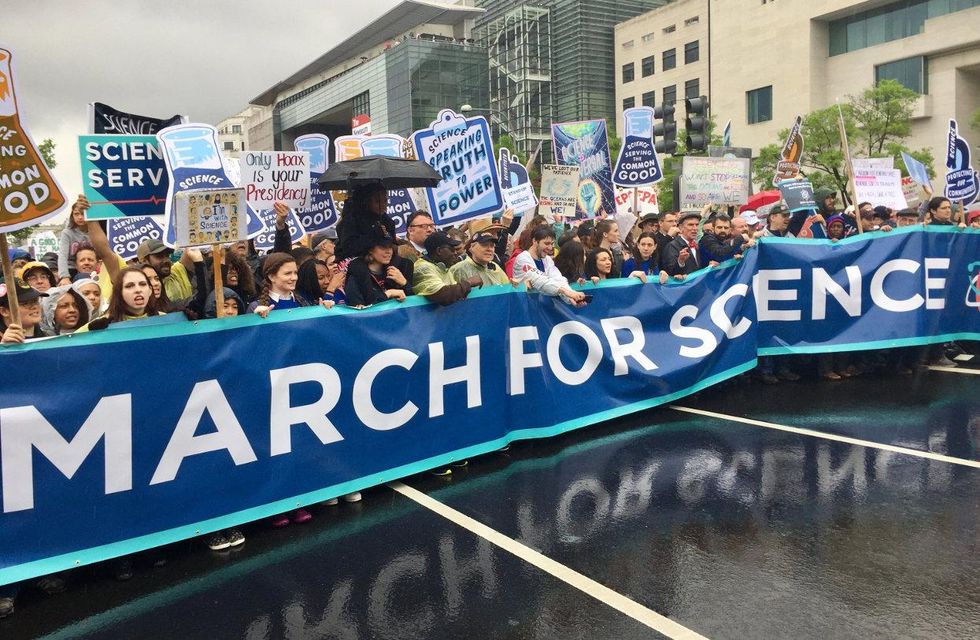
Moving forward after four years of fights and falsehoods
As the US turns the page on a skeptical and openly hostile administration, environmental science and journalism face continued obstacles—but there is some optimism.
What the hell just happened?
Our democracy was pushed to its absolute limit last week when rioters stormed the U.S. Capitol. We're coming off a year of contentious politics, the first global pandemic in more than 100 years, and a battered U.S. healthcare system, economy, and collective psyche.
Misinformation was at the core of many of these crises—and is central to much of the chaos over the past four years. However, this has been brewing for some time. The election and COVID-19 denial, and attacks on public health officials were a natural response for the portion of the country that has increasingly embraced fringe theories, and eschewed rigorous science in favor of unverified YouTube videos or Facebook posts.
Trump has lied tens of thousands of times in office and has displayed a stunning disconnect with reality, so it is little surprise that he spent 2020 – and the beginning of 2021 – repeatedly attacking the two institutions that aim to get at truth: journalism and science. From labeling the press the "enemy of the people," to suggesting we look into bleach injections to fight COVID-19, to all but ignoring climate change during his tenure, no president has had a more contentious relationship with science, journalism, and the truth.
He may be leaving office, but what did we learn? How did environmental reporting and science hold up?
We spoke with leaders in the environmental science and journalism worlds to take stock of how these sacred institutions held up, what lessons can be learned, and where we're headed in 2021 as we use research and reporting to advance truth, accountability and justice.
Media experts see hope in the resurgence of major media outlets over the past four years but continued challenges for local and smaller outlets. A renewed focus on transparency, real-time fact checks on social media, bolstered newsroom diversity, and amplified ethical codes will all play a role in journalism's next chapter. The proliferation of propaganda outlets masquerading as news will remain a hurdle—with education and news literacy as the most potent antidotes.
Scientists see an opportunity to have scientific evidence once again play a role in policymaking under a Biden Administration, and point to a long list of actions under Trump that should be re-analyzed with an eye toward public health. Scientific research in many ways faces the same challenges as journalism in regaining public trust.
"Scientists need to improve the degree to which they explain not just the detailed findings of our science—but also the process," John Harte, a professor in the Department of Environmental Science, Policy & Management at University of California, Berkeley, said. "The public has very little clue what it means to do science, and we've neglected in the schools and public talks to put more emphasis on what it is that makes science, science."
Meaghan Parker, executive director of Society of Environmental Journalists warned that the disinformation campaigns can, will, and already are branching beyond journalism and science.
"We have to look at these organized campaigns to undermine journalism and science as something that can be done to anything," Parker said. "This is not unique to just climate change or vaccines, but now things like COVD-19...and, well, democracy itself."
The “immune system of democracy”
Playing nice with the media, of course, is not the job of the president or his/her administration. An antagonistic relationship between the two institutions is as old as the country itself, according to Harold Holzer, an author, lecturer, and director of the Roosevelt House Public Policy Institute at Hunter College whose most recent book is "The Presidents vs. the Press."
George Washington, Thomas Jefferson, Abraham Lincoln, Theodore Roosevelt all used phrases close to fake news or false news, Holzer said during a December event with the National Press Foundation. Such language "has been the result, natural or unnatural, of criticism. It goes back to the earliest days of the republic," he said.
Parker said another trend predating Trump—and regardless of party—has been increasing "efforts to exert message control." SEJ and multiple other journalism associations often took issue with the Obama Administration, for example, for muzzling federal officials.
But the last four years were different, Parker said. "The [Trump] Administration used hostility to the press as a political tool to not only engage support but manipulate the understanding of what is reality. Media's been a punching bag for politicians for centuries, but it's way beyond that to create a sense that you can't believe anything."
The Trump Administration also put a tight lid on press access.
Deb Krol, Indigenous affairs reporter focused on climate, culture & commerce for The Arizona Republic, said she and colleagues "definitely noticed more difficulty in accessing people we needed to access" —particularly at the Interior and Agriculture departments, two agencies particularly important to her readers.
Other agencies—such as the U.S. Geological Society—that used to allow scientists to quickly respond to media requests now require approval from the Department of Interior before speaking to reporters.
Despite these roadblocks, environmental reporting itself—and readership and viewership—thrived in the past year, said Dan Fagin, director of New York University's Science, Health and Environmental Reporting program and former reporter. "Audiences are bigger than ever," he said. "Climate change is becoming more important, COVID speaks for itself – these are the most critical issues on the planet at this moment and they are science issues, environmental issues."
Fagin pointed to a few positive signs in the industry of the past year, including that the New York Times'digital revenue now exceeds that of print, that science outlet Stat News is expanding after a massive readership increase during the pandemic, and that publications like The Atlantic so adeptly covered COVID-19 and Black Lives Matter in a tumultuous year.
However, President Trump's four years of actively trying to erode trust in the media seems to have worked. A Gallup poll released in September found just 9 percent of people in the U.S. trust mass media "a great deal" and 31 percent "a fair amount." Among Republicans the numbers are even lower.
Such mistrust is a "huge problem," Fagin said.
Craig Newmark, founder of Craigslist and whose philanthropic efforts include major investments in journalism and combatting disinformation, said "a trustworthy press is the immune system of democracy."
"Accuracy is hard, lying is easy," he said. "Inflammatory news often sells better, and it's easier to come up with something inflammatory or untrue, or partially true, than to do the research and fact checking."
Everyone wants to belong to a group, Fagin noted, with group identity often tied to a shared set of beliefs set by group leaders. When leaders build those beliefs on falsehoods rather than facts, truth loses. "When a political leader sets the terms of membership in his or her group by saying we don't believe climate change is real or is skeptical about masks' ability to prevent an airborne virus, that becomes really problematic for us as reporters," Fagin added. The result? "People flat out reject the evidentiary basis of our work."
SEJ's Parker said small steps such as reporter transparency ("here's how I reported this piece") can go a long way, as well as Twitter and other platforms flagging false or misleading content. She also said journalists need to avoid "giving oxygen to falsehoods," which often happens due to reporting that gives two opposing sides equal time—even when one side doesn't have evidence on their side. "Environmental journalism has already gone through this with climate change," she said.

Press conference by President Trump at the NATO Summit in Brussels in 2018. (Credit: NATO North Atlantic Treaty Organization/flickr)
Fagin said reporters need to humanize their work and not just rely on data, and report on topics in a way that doesn't make people feel they need to change their identity. "We need to make sure we let audiences know they don't have to fundamentally change who they are to acknowledge the evidence, reality, and to take on new arguments and ideas. That is difficult to do, but possible."
Newmark said we may come to a point where "if you want news you can trust, you may have to pay for it."
Newmark has given $40 million to journalism over the past five years. Some of his grantees—including The Trust Project, which works with outlets to use "trust indicators"—show what and who is behind a published news story to fight disinformation and garner public trust. He also said publications should be blatant in their code of ethics that they "will tell the truth, and won't amplify disinformation," and suggested professional organizations like the Society of Professional Journalists should call attention to publications that do—and don't—have such codes.
And, while far from a perfect funding model, nonprofit news sites continue to increase—at a rate of roughly 12 or so more per year, according to the Institute for Nonprofit News 2020 report. The nonprofit news world has spurred more collaborative reporting—which stretches dollars and resources and fills holes in news deserts.
ProPublica's Local Reporting Network, for example, has brought on fellows from Alaska to West Virginia to work in the network, offering resources and co-publishing.
Environmental Health Sciences, publisher of EHN.org and DailyClimate.org, doubled its readership in 2020. Partnerships with George Washington University, Scalawag in North Carolina and The Narwhal in Canada led to diverse, investigative pieces on cross-border pollution and environmental racism – as well as a ground-breaking program for early career scientists of color, Agents of Change.
Rollbacks and rule changes
Harte, from the University of California, Berkeley, said he looked at three aspects of science over the past four years: the capacity or ability of scientists to do their science, the effectiveness of science in the policy arena, and public understanding and acceptance of science.
All three have a "glass-half-full argument and a glass-half-empty argument," Harte said.
Lab and field work for academic and independent scientists haven't been as affected as Harte initially thought.
"Each year the Trump Administration would recommend big cuts in major funders of science, and each year Congress pretty much ignored the Administration," Harte said. "The ability of scientists to get grants and do our research hasn't changed significantly over these four years."
The science continues to move forward, and has been "relatively resilient to political changes and wind," agreed David Andrews, senior scientist with the Environmental Working Group (EWG).
However, the ability of federal scientists to conduct research has taken a huge hit, said Ruthann Rudel, director of research at the Silent Spring Institute.
"EPA scientists had a tough time doing their work, there was limited research, limited enforcement, and they were kind of muzzled," said Rudel.
"We're refighting past battles about clean air, climate change, mileage standards." The Administration has rolled back more than 100 environmental rules (to varying degrees of success).
Harte called this the "single biggest tragedy. Government no longer makes policy based on good science."
"Trump closed off agencies to voices of science from the outside – and on the inside, replaced many agency scientists with political hacks," Harte said.
On the environmental health front, Rudel said one of the major problems was how the implementation of the Toxics Substance Control Act (TSCA) was rolled out. TSCA was changed in 2016, and new chemicals coming to market now required the EPA to sign off on their safety.
The EPA has charged ahead approving chemicals without transparency in its health reviews, Rudel said. The agency has hidden documents and information from the public about approved chemicals; routinely doesn't alert the public when new chemicals are under review; and doesn't adequately audit companies' chemical claims, according to an Earthjustice investigation about the Administration's adherence to TSCA.
According to EWG, since 2016 the EPA has reviewed more than 3,000 new chemical submissions, and more than 1,000 have been approved through the low volume exception.

March for Science in Washington, DC, 2017. (Credit: Becker1999/flickr)
Rudel also said the EPA's transparency rule is a "threat to science." The rule finalized last week, requires scientists to show all of their raw data before the EPA would consider using it in rulemaking. Academic and independent scientists have blasted the rule, since many of these studies rely on personal information gathered confidentially, and couldn't be shared. This makes it much harder to use many rigorous, peer-reviewed studies to enact clean air and water rules. Many expect the incoming Biden Administration to overturn the rule, though such an attempt could take months.
Andrews saw some positives, especially on science, understanding, and state action on PFAS chemicals. He pointed to "incredible amounts of science" on the compounds coming out from universities, NGO's, as well as the EPA, discovering the compounds in places like New Jersey, Alabama, and North Carolina.
While federal regulation on the chemicals hasn't happened as quickly as needed, he said, annual defense federal spending bills are recognizing the PFAS threat. The National Defense Authorization Act for 2021, for example—made law over Trump's veto—requires the Pentagon to phase out nonessential PFAS use, expand testing for the chemicals in people, provide funds for cleanup, and mandates a study on the use of PFAS in firefighting and the risk to firefighters.
And "many states have stopped waiting for the federal government to take action," Andrews added, and have set their own drinking water standards, including California, Connecticut, Colorado, Minnesota, North Carolina, New Hampshire, New Jersey, and Vermont. People are becoming "more aware limitations of the federal government when it comes to environmental health concerns."
As for public understanding and acceptance of science, Harte said "it could have gotten much more damaged than it was."
Harte said it is incumbent on scientists to foster understanding and acceptance of their work.
Scientists need to communicate not only the nature of science, but "the joy of it, the thrill, the rigor, the toughness, the quest, the mystery, the beauty of it all," he said.
"If that were better understood, then the specifics—like how a pandemic spreads, how sea levels rise—would be more acceptable and more understood by the public. Instead of just throwing facts and figures, we should try to explain how we came to these conclusions," he said.
Rudel said she's "optimistic that most people actually do like science, but the media gives a lot of attention to people trying to cast doubt. I'm hopeful that under different leadership maybe we'll have more comfort with evidence-based approaches."
While the Trump Administration may have been something of a political anomaly, it is clear that misinformation and attacks on the press and science are now an embedded political strategy.
"Democracy survived, the institutions survived," Harte noted, "but what happens next time?"
Banner photo: Trump supporters storm the U.S. Capitol on January 6, 2021. (Credit: Brett Davis/flickr)














